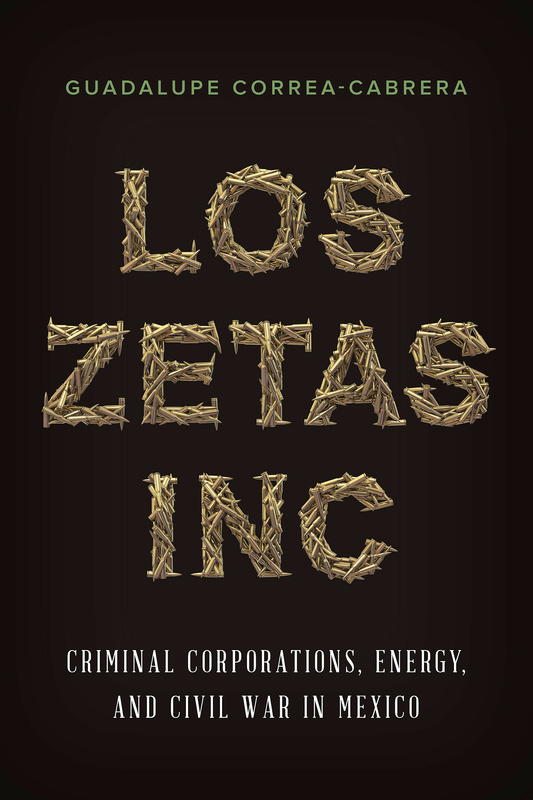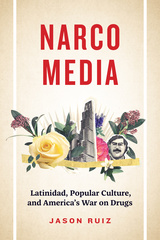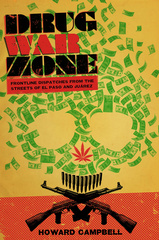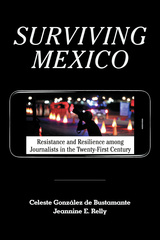Our shopping cart is currently down. To place an order, please contact our distributor, UTP Distribution, directly at utpbooks@utpress.utoronto.ca.
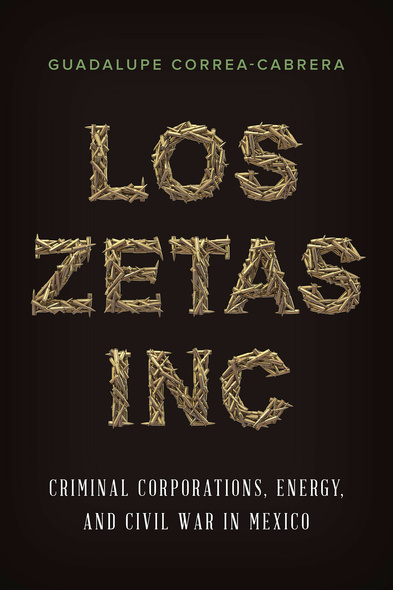
Los Zetas Inc.
Criminal Corporations, Energy, and Civil War in Mexico
The rapid growth of organized crime in Mexico and the government’s response to it have driven an unprecedented rise in violence and impelled major structural economic changes, including the recent passage of energy reform. Los Zetas Inc. asserts that these phenomena are a direct and intended result of the emergence of the brutal Zetas criminal organization in the Mexican border state of Tamaulipas. Going beyond previous studies of the group as a drug trafficking organization, Guadalupe Correa-Cabrera builds a convincing case that the Zetas and similar organizations effectively constitute transnational corporations with business practices that include the trafficking of crude oil, natural gas, and gasoline; migrant and weapons smuggling; kidnapping for ransom; and video and music piracy.
Combining vivid interview commentary with in-depth analysis of organized crime as a transnational and corporate phenomenon, Los Zetas Inc. proposes a new theoretical framework for understanding the emerging face, new structure, and economic implications of organized crime in Mexico. Correa-Cabrera delineates the Zetas establishment, structure, and forms of operation, along with the reactions to this new model of criminality by the state and other lawbreaking, foreign, and corporate actors. Since the Zetas share some characteristics with legal transnational businesses that operate in the energy and private security industries, she also compares this criminal corporation with ExxonMobil, Halliburton, and Blackwater (renamed “Academi” and now a Constellis company). Asserting that the elevated level of violence between the Zetas and the Mexican state resembles a civil war, Correa-Cabrera identifies the beneficiaries of this war, including arms-producing companies, the international banking system, the US border economy, the US border security/military-industrial complex, and corporate capital, especially international oil and gas companies.
Correa-Cabrera’s book approaches the Mexican Drug War through an analysis of the Zetas—the most powerful, well-armed, and technologically-advanced criminal corporation in Mexico. . . . This impressive contribution reveals the horrific realities, complexities, and products of neoliberal capitalism—though it is not so much of a ‘new’ violence as much as an evolution of existing forms of it.
The strength of Correa’s book is that she links security and political economy outcomes in Mexico in a way that is not reductionist. That is, she avoids ascribing the economic outcomes of the Mexican drug war to the logic of neoliberalism or of capitalism more generally, but rather considers the complex political mediations between the calculations of political elites and the expansion of transnational extractive activities in Mexico.
Los Zetas Inc. is a state of the art study of organized crime and drug trafficking studies in Mexico...It is a major book that should be required reading in social sciences classes on contemporary Mexico.
This book is most assuredly a strong contribution…[Correa-Cabrera] develops a fine-grained analysis of what is taking place in Tamaulipas much more thoroughly than anyone before, and the reader can easily appreciate what goes into making what is happening here a security crisis that goes far beyond the state.
Timely…useful for students and scholars interested in Mexico's Drug War, or, more generally, in the relationship between 'development' and the violence that so often accompanies natural resource booms.
[Correa-Cabrera] not only provides great historical detail on the formation, evolution, and internal organization of the Zetas, but also offers a careful review of Mexico's most recent political and economic reforms, which are deeply related to changes in the criminal organization...the many thought-provoking concepts, analyses, and new forms of evidence Correa-Cabrera presents should push Mexican policymakers and organized crime experts alike to formulate and answer new and urgent questions to better understand, and hopefully help resolve, a reality that has led to the deaths and disappearances of tens of thousands of people across the country.
[Los Zetas Inc.] provides new arguments and fresh perspectives on the already existing works about transnational criminal organisations, how they work, links to energy firms, and paramilitary characteristics of drug cartels in Mexico. The book shows extensive research as well as concrete evidence which demonstrates that Correa-Cabrera’s main aim is to depict Los Zetas as a criminal enterprise that has roots in a business corporation model, and the widespread power a drug cartel can achieve within a country.
The recent energy reform in Mexico appears to have opened exploitation to a modern network of ruthless transnational criminal organizations and their partners in business and government. This book makes a momentous contribution to understanding that process. It will be required reading for scholars and students of Mexican/border politics and energy policy, US government agencies, security consulting firms, and nonprofit organizations.
Correa-Cabrera’s book takes us inside the Zetas. Her unprecedented access to this organization and her ability to gain the confidence of her subjects provides us an extraordinary understanding of the evolution and current state of this powerful transnational criminal organization. She goes beyond the simplistic view of Los Zetas as a drug-trafficking organization and shows how they have diversified into many different sectors, including different components of the lucrative energy sector. This is essential reading for those interested in Mexican society and politics, as well as those who seek to understand the growth and development of criminal organizations.
When Felipe Calderón declared war on organized crime in Mexico, he did not foresee the humanitarian tragedy that this war would cause. Little by little, the consequences of this ignorance have been corrected, but many gaps and problems remain. In this book, Guadalupe Correa-Cabrera makes a critical contribution to our understanding of Los Zetas, one of the bloodiest crime syndicates of all time. Los Zetas Inc. is essential reading for all those who seek to develop a viable strategy for stopping violence in Mexico.
GUADALUPE CORREA-CABRERA is an associate professor of public affairs and security studies at the University of Texas Rio Grande Valley. She is the author of Democracy in “Two Mexicos”: Political Institutions in Oaxaca and Nuevo León and a frequent commentator in national and international news media on drug trafficking issues and drug violence in Mexico.
- List of Maps, Tables, and Figures
- Abbreviations
- Acknowledgments
- Introduction
- Section I. The Zetas: Criminal Paramilitaries in a Transnational Business
- Chapter 1. The Zetas’ Origins
- Chapter 2. The Zetas’ War
- Chapter 3. A Transnational Criminal Corporation
- Section II. Mexico’s Drug War: A Modern Civil War?
- Chapter 4. Paramilitarization of Organized Crime and a “War on Drugs”
- Chapter 5. The New Paramilitarism in Mexico
- Chapter 6. Mexico’s Modern Civil War
- Section III. Los Zetas Incorporated
- Chapter 7. The Zetas’ War and Mexico’s Energy Sector
- Chapter 8. Energy and Security in Tamaulipas, Ground Zero for the Zetas
- Chapter 9. Who Benefits from the Zetas’ War?
- Conclusion. Four Successful Business Models in an Era of Modern Civil Wars
- Appendix 1. Energy Reform and the Zetas’ Expansion (Timeline)
- Appendix 2. History of Organized Crime in Tamaulipas: Timeline of Key Events
- Appendix 3. Map of Criminal Paramilitaries and Natural Resources in Mexico
- Appendix 4. El disfraz de la guerra (The War’s Disguise): Communiqué by Residents of La Ribereña
- Appendix 5. Organizational Charts: Constellis Holdings, LLC, and Los Zetas Inc.
- Appendix 6. Areas of Dominant Influence of Major TCOs in Mexico, 2015
- Notes
- References
- Index

